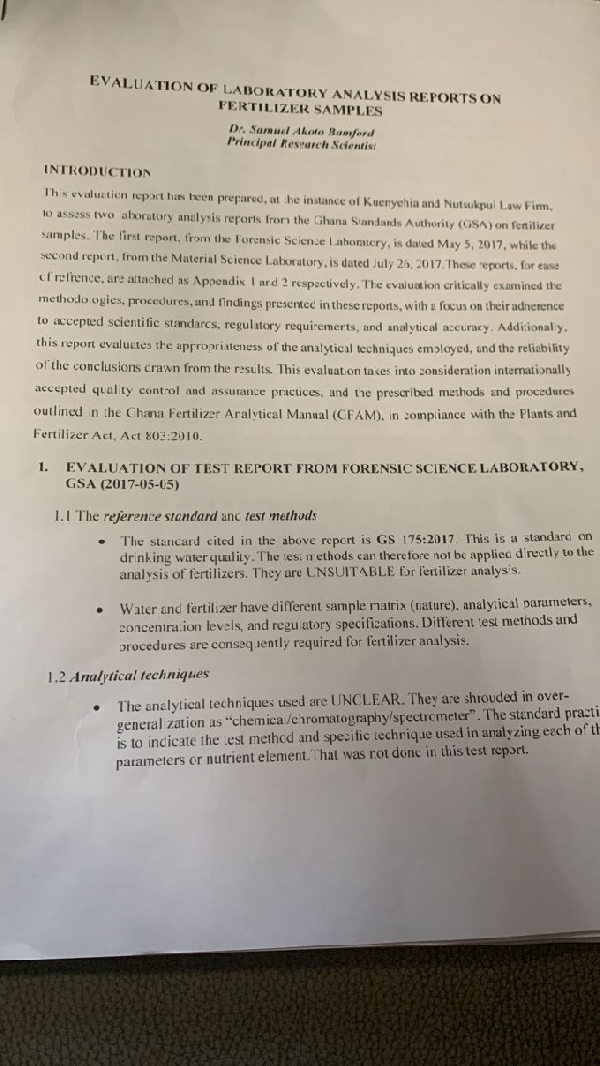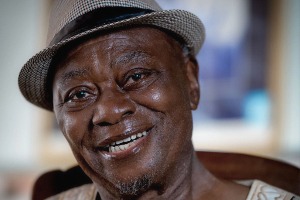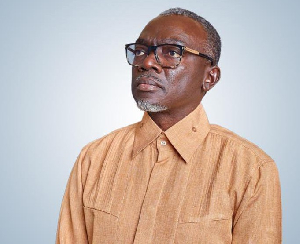A report relied upon by prosecutors in the trial of Dr. Stephen Kwabena Opuni, the former Chief Executive of Ghana Cocoa Board (COCOBOD), and businessman Seidu Agongo, has been criticised as lacking scientific validity.
The testimony delivered Monday by Dr. Samuel Akoto Bamford, a Principal Research Scientist with Ghana's School of Nuclear and Allied Sciences at Atomic Energy, raised questions about the reliability of a fertiliser test report prepared by scientist Quartey-Papafio. The report, which prosecutors have presented as evidence in the ongoing case, was described as “unreliable” with conclusions that were “contradictory.”
Dr. Bamford, testifying as the ninth defence witness for Mr. Agongo and his company, Agricult Ghana Limited, stated, “The reference number stated in the Quartey-Papafio report is a standards reference for drinking water.” He further explained that “water and fertilizer have different natures or matrices,” arguing that the methodologies employed in the report were unsuitable for fertiliser analysis.
Prosecutors have charged Dr. Opuni and Mr. Agongo with 27 counts, including defrauding by false pretences, willfully causing financial loss to the state, money laundering, corruption, and violations of the Public Procurement Act. Both defendants have pleaded not guilty and are on GH₵300,000 self-recognisance bail.
Dr. Bamford pointed out that the Quartey-Papafio report relied on standards intended for analysing drinking water, specifically citing standard GS175. According to Dr. Bamford, the report failed to adapt its methodology to the distinct requirements of fertiliser testing, resulting in findings that were “unclear and ambiguous.”
“The reporting of the few parameters analysed was not according to the practice in the analysis of fertiliser,” Dr. Bamford testified, noting that the report included only three parameters—calcium, magnesium, and urea—insufficient to determine whether the tested sample met fertiliser standards.
“The conclusion of Quartey-Papafio’s report is contradictory to their own results,” he said. “It can not be relied upon because the results are inaccurate and the conclusion wrong.”
In contrast, Dr. Bamford defended the credibility of a Material Science Report relied upon by the defence. He described it as adhering to prescribed standards outlined in the Ghana Fertiliser Analytical Manual and the Plant and Fertiliser Act (Act 803).
“The reference standards and methods used in the Material Science report, in Appendix 2, are acceptable because they complied with the prescribed method for fertilisers,” he said.
According to Dr. Bamford, the Material Science Report analysed eight parameters relevant to fertiliser composition and used clearly defined analytical techniques. “The results they obtained led them to conclude by identifying the sample they analysed as a fertiliser,” he told the court.
Dr. Bamford underscored the contrast between the two reports, saying, “From my evaluation of Quartey-Papafio’s report, it can not be used, in my opinion, as a basis for disqualifying any product as a fertiliser.”
The trial has seen seven prosecution witnesses and ten defence witnesses for Dr. Opuni, who closed his case in 2023. Mr. Agongo and Agricult Ghana Limited are now presenting their witnesses with Dr. Bamford being the ninth called by their legal team.
Both defendants face scrutiny over alleged financial losses to the state amounting to GH₵217 million and are contesting charges that they procured and distributed substandard fertiliser. The trial continues under Justice Aboagye Tandoh at the Accra High Court.

General News of Tuesday, 14 January 2025
Source: classfmonline.com

















